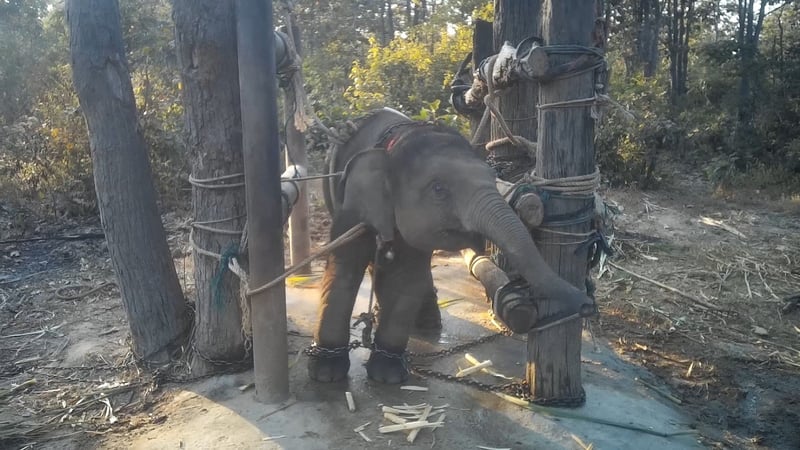
An appeal to the international travel industry; don’t send the elephants back to work
News
As the world slowly emerges from the confinement of COVID-19 lockdown our thoughts naturally turn to travel, holidays and freedom. When can we book our next holiday and where will we go?
By Audrey Mealia: Global Head of Wildlife at World Animal Protection
Elephant riding has long been on some animal lovers wish lists, but we need to rethink the way we view wildlife and tourism, especially in the midst of a pandemic that originated from close contact between people and wild animals.
Many wild animals in the tourist industry undergo cruel training in order to be tame enough to interact with tourists, and elephants are no stranger to this. The working life of a captive elephant begins at the tender age of two, when it’s forcibly removed from its mother to begin cruel training for a life of servitude in the tourism entertainment industry. In the wild, these majestic animals live in matriarchal groups where females stay with their mothers, grandmothers, sisters, aunts and daughters until they die surrounded by their loving family, much like us.
Elephant owners pay good money to have their animals trained, and a sophisticated price list exists to teach each ‘trick’. The more the elephant has to learn, the more it suffers, as documented by World Animal Protection in the first undercover footage of elephant training (otherwise known as the crush) to be released in over 15 years. The footage makes for heart breaking viewing as it breaks down the four stages of training that every elephant in captivity endures to be ‘safe’ enough to come into close contact with humans.
Elephants that are born in captivity are still innately wild animals - not the tame, gentle giants that venues would have us believe. Bull hooks are the weapon of choice in the constant battle to subdue them. Anyone riding an elephant may witness how control is maintained through frequent blows to the head with the blunt end of a bull hook, while their sensitive ears are raked with the sharp point to indicate which direction they need to turn. It’s the same when they’re performing tricks or even simply being washed and fed by hordes of tourists.
They do not nuzzle us with their trunks nor accept food from us because they love us. They do not ‘dance’ for us because they are happy. All of these actions are sadly motivated by fear and in some cases hunger, because of the inadequate diets many are fed. From the time they are trained as babies, they have already learned to fear the bull hook and the pain it inflicts.
It would be easy to point the finger of blame at the trainers and mahouts for all this suffering however, mahouts are exploited as much as the elephants themselves. Poorly paid, they work in extremely dangerous conditions with no benefits, job security and little respect. The profit from this highly lucrative trade does not end up in their pockets. In reality the growing elephant entertainment industry in Thailand is supply and demand, built by and for tourists and travel companies.
There is no pension plan or cosy retirement for working elephants to look forward to. Many will die in the camps they’ve spent their entire lives chained-up in. And when not chained they are taking tourists on rides or painting pictures and walking tightropes for cheering crowds. Day in, day out, for up to sixty years. Our insatiable demand for a once in a lifetime experience with wild animals, condemns these highly social and intelligent creatures to a lifetime of misery.
We know that tourists usually want to see elephants because they love wildlife. Understanding the cruelty going on behind the scenes, would make any compassionate person want to reach out and comfort these extraordinary animals, but unfortunately that’s part of the problem. If we truly love wildlife, the very best thing we can do is to keep our distance. Tragically, most captive elephants in Thailand cannot be returned to the wild. Issues such as loss of habitat and human conflict prevent a safe return.
A proper sanctuary that replicates their natural environment where elephants are free to roam and forage all day and form family groups is the next best thing to a life in the true wilderness. And we can still enjoy them, but by simply observing them from a distance it is safer for them, for us and for their mahouts.
As the travel Industry rebuilds from COVID-19 it has a real opportunity to make right the wrongs that have been created by commodifying wild animals across the globe. Afterall, COVID-19 is itself the result of our exploitation of wildlife and will not be the last zoonotic pandemic if we don’t change our ways. By creating and implementing a comprehensive animal welfare policy, with a commitment to no longer profit from the suffering and exploitation of captive wildlife, the tourist industry has an opportunity to lead the charge towards safeguarding our precious natural world for future generations and for the health of animals, people and the planet.
They do not nuzzle us with their trunks nor accept food from us because they love us. They do not ‘dance’ for us because they are happy. All of these actions are sadly motivated by fear and in some cases hunger, because of the inadequate diets many are fed.